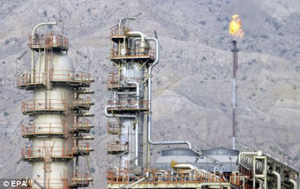 AFP: The development of Iran’s South Pars gas field in the Gulf has been delayed partly because of international sanctions, the spokesman for the Iranian parliament’s energy commission said on Monday.
AFP: The development of Iran’s South Pars gas field in the Gulf has been delayed partly because of international sanctions, the spokesman for the Iranian parliament’s energy commission said on Monday.
By Laurent Maillard
 TEHRAN (AFP) — The development of Iran’s South Pars gas field in the Gulf has been delayed partly because of international sanctions, the spokesman for the Iranian parliament’s energy commission said on Monday.
TEHRAN (AFP) — The development of Iran’s South Pars gas field in the Gulf has been delayed partly because of international sanctions, the spokesman for the Iranian parliament’s energy commission said on Monday.
The delay was “partly due to giving the work to Chinese contractors,” since “we cannot award the work to contractors from other nations due to international sanctions” on Iran, Emad Hosseini was quoted as telling the Fars news agency.
“Under our planning, we should have had 30 percent progress in the South Pars projects by now, but we are very far behind in the plans,” Hosseini said.
Fars reported last week that the nine South Pars projects awarded in June 2010 to Iranian companies as part of a $21-billion contract progressed between only 13 percent and 23 percent in a contract that was due for completion in 35 months.
“If we continue like this, we will not finish on time,” Hosseini warned.
Many of the projects were reassigned to Iranian firms following the pull-out of major Western firms including France’s Total and the Anglo-Dutch Shell, after international sanctions against Iran’s controversial nuclear programme were strengthened.
“We had no choice but to resort to Chinese contractors, but they seem to be unable to carry out projects and we will have to reconsider their participation,” Hosseini said.
Several times in recent months, Iran’s parliament has expressed concern over delays in the development of South Pars, a huge offshore natural gas field shared between Iran and Qatar.
South Pars offshore field holds around 14 trillion cubic metres of gas, or eight percent of world reserves, and Qatar began exploiting it a decade sooner than the Islamic republic.
Western sanctions against Iran, tailored under six UN resolutions condemning its nuclear programme since 2006, mostly target the country’s banking and oil sectors, and are aimed specifically at slowing the development of South Pars.
They prohibit any investment, technology transfer or sale of equipment in the oil and gas sectors to Iran, the second largest producer in OPEC, which earns 80 percent of its foreign exchange from the selling of petroleum products.
Tehran has said it is able to develop South Pars on its own, notably by giving many of the projects to companies affiliated to its elite Revolutionary Guards Corps.
But the withdrawal of the Western companies has led to a growing presence of Chinese oil firms, which since 2006 have announced a total investment in Iran of $28 billion.
However, Western experts, based on assessments by the Sino-Iranian Chamber of Commerce, say actual Chinese investment in Iran is closer to one billion dollars.
Last week media reported that the oil ministry had issued a warning to the China National Petroleum Corporation, a state company, for not carrying out a $4.7-billion contract signed in 2009 to develop Phase 11 of South Pars, after Total withdrew from the project.
In 2010 Beijing became the top economic partner of oil-rich Iran, which has the world’s second largest natural gas reserves after Russia.


